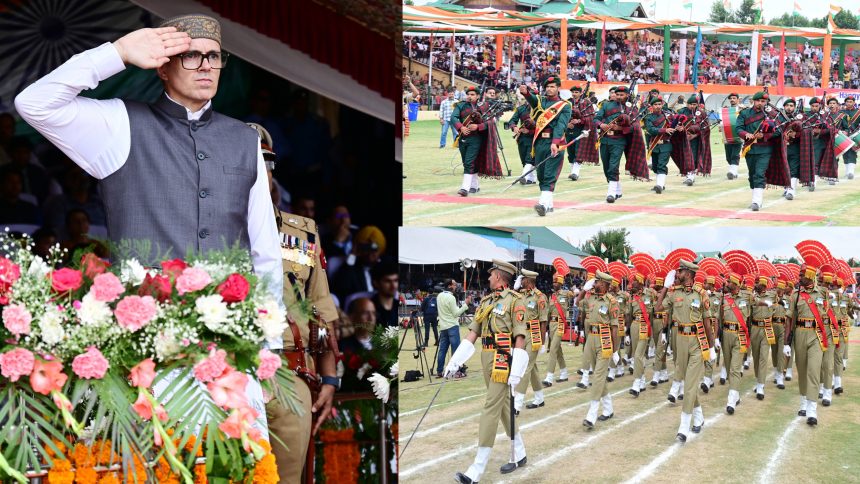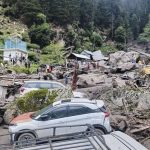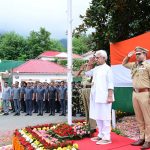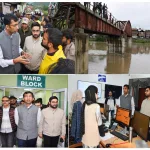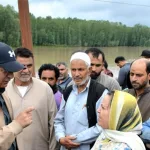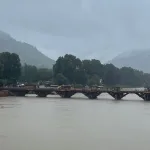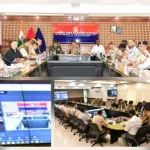Srinagar, Aug 15: Jammu and Kashmir Chief Minister Omar Abdullah on Friday said that the Union Territory had been stripped of its special identity, statehood and powers, and was now governed under a system “designed for failure” that tied the hands of its elected representatives.
“It’s been 11 years since I last addressed the people of Jammu and Kashmir on this day as the Chief Minister of our state. At that time, we had our own special status, our own flag, our own constitution. Today, none of that is left. Even the status of our state is not ours anymore,” Omar said in his Independence day address at Bhakshi Stadium Srinagar.
He said the people of Jammu and Kashmir had “waited a long time to regain democracy” but still did not have a clear answer on why the process had been so delayed. “It is true that people have their own government today, but the scope for change has been limited,” Omar added.
“I had no intention of reading a government’s prepared speech because that would have made it seem like everything is fine and no change is needed. The truth is, much change is needed.”
The Chief Minister said there had been widespread anticipation that the Union government would announce a major decision for Jammu and Kashmir on Independence Day. “We were told the papers were being prepared, that it was just a matter of time,” he said. “We waited. It did not happen. The ray of light I used to talk about is dimmer now.”
While stressing that he refused to “give up or be helpless,” Omar acknowledged that his optimism was not as strong as in earlier years. “Hope is less now,” he said. “That is the truth and it is because the promises we were given have not been fulfilled.”
He said that the changes since 2019 had been framed as measures to integrate Jammu and Kashmir fully with the rest of the country and ensure equal status. “If the answer is yes, I have nothing to say,” Omar said. “But if it is no, then tell me what was our fault? What did we do to deserve this?”
Drawing on his experience as both a former Chief Minister of a state and the current head of a Union Territory government, Omar described the difference as “day and night.”
“I know the difference between a state and a Union Territory,” he said. “The system here is designed for failure. It looks good on paper, but the less said about its practical reality, the better.”
He likened the current governance framework to “tying a horse’s front legs and then asking it to run.” Omar said, “The horse might walk, it might move forward, but not with the speed or freedom it should. That is our condition. We have power, but our hands are tied.”
Omar rejected suggestions that his government had achieved little in its ten months in office. “As soon as we came to the Assembly, we passed a resolution to restore Jammu and Kashmir’s special position,” he said.
He listed several budgetary decisions aimed at improving public services and daily life. “We took budget decisions to improve people’s daily lives in education, health, social welfare, transport, tourism, and agriculture,” Omar said. “When electricity was disrupted in winter, we restored it quickly. When water supplies were hit, we ensured they were resumed. In agriculture, we increased allocations so that farmers could get more support.”
He said unemployment was a central challenge and could not be addressed solely through government jobs. “No government in the world can give every unemployed person a government job,” Omar said. “That is why we launched ‘Mission Yuva’ to create livelihood opportunities for 4 to 4.5 lakh young people.”
Omar said his administration had also restored the powers and funds of elected MLAs. “We increased constituency development funds from Rs 3 crore to Rs 4 crore so that MLAs can respond directly to the needs of their people,” he said.
One of the biggest obstacles to effective governance, Omar said, was the breakdown of the accountability chain. “The bureaucracy is supposed to answer to the government, the government to the Assembly, and the Assembly to the people,” he said. “In Jammu and Kashmir, this chain is broken because officers are not answering to the elected government.”
He said without restoring this chain of responsibility, talk of a “new Jammu and Kashmir” would be meaningless. “Newness in name means nothing,” Omar said. “The word should have meaning, weight, and power which it does not have today.”
Omar expressed disappointment at hearing in the Supreme Court that the timing of statehood restoration might be linked to the recent Pahalgam attack. “Will the murderers of Pahalgam decide when Jammu and Kashmir becomes a state again?” Omar asked. “We are being punished for a crime we did not commit.”
He recalled that people from Kathua to Kupwara had protested after the attack, declaring it was not in their name. “Yet the incident is being used to keep us from statehood,” Omar said.
He added that elected governments had successfully prevented such attacks in the past. “We have not failed before, and God willing, we will not fail after this,” he said.
Omar reiterated that restoring statehood was the “first step to changing the future of Jammu and Kashmir” and a fundamental matter of rights. “Is it a crime to demand your rights?” he asked.
He said that his party’s approach would always remain within the framework of India’s democracy and constitution. “Anything we achieve must be within the democracy and constitution of India,” Omar said. “And our people will only benefit from good relations with our neighbours.”
Omar said he had been mocked for his stance and was aware of the political risks. “A clap is made with two hands, not one,” he said. “If we do not ensure that Jammu and Kashmir enjoys the full benefits of being part of India’s democracy and better relations with neighbours, the consequences will be heavy for all of us.”
Omar also said that any progress for Jammu and Kashmir must occur under the democracy and Constitution of India, and that the J&K will not benefit from confrontations with the Centre. “If we achieve something, we will achieve it by establishing good relations with Delhi,” he said.
Acknowledging the political challenges and personal disadvantages he has faced, the CM said he is willing to bear the cost because he believes his approach is correct.
He added that Jammu and Kashmir will only gain from being fully integrated within India’s democratic framework and by maintaining constructive relations with the central government.
Omar further said that his government will soon launch a signature campaign across all 90 constituencies of Jammu and Kashmir to rally public support for the restoration of full statehood.


